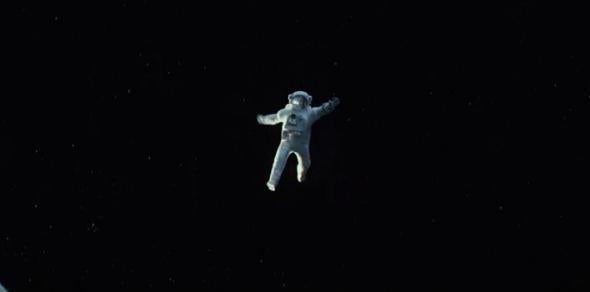Like most earth-habituated people who saw Alfanso Cuarón’s much-anticipated space thrillerGravity this past weekend, I left the theater physically exhausted—91 minutes of heart-racing, mortality-confirming flirtation with the merciless-yet-awe-commanding void will do that to you. On the merits of visual inventiveness and killer pacing alone, Gravity will undoubtedly be remembered as a remarkable work of cinema. But, since the adrenaline rush has worn off, I’ve begun to suspect that it will be remembered as something else as well. Maybe it’s the lack of oxygen in my marshmallow-man space suit, but Gravity has the makings of a camp classic.
Before I argue this case, let’s be clear about what I mean by camp. I’m not talking about simple humor: An affable George Clooney and his trusty jet-pack provide a modicum of that throughout much of the film. The little details that point to Gravity’s future camp reception are just that—minor nuances and narrative moments that are just slightly too peculiar, too exaggerated, or too askew to go unnoticed. Importantly, they are not intentionally “funny” or campy, even if we can’t help but take them that way. Indeed, in its total lack of camp intentionality, Cuarón’s space jaunt just might become one of the canon’s greats. As I and others have written before, the best camp often arises from naiveté, and this movie’s thematic cargo hold of WONDER, DESPAIR, DANGER, and HOPE begs for a camp escape hatch, lest we suffocate in its oppressive earnestness.
But that’s all backdrop. Camp lives in those random moments at which you can’t help but say, “Girl. Come on.” When you are momentarily knocked off narrative course by a piece of wild aesthetic debris that simply won’t be ignored. If you think you didn’t experience a few of these unintentional detours in Gravity, you’re either lying or were just too stressed out to notice. The latter is a fair excuse: I’ll allow that my argument may only be vindicated on a second viewing, once the shock-and-awe has worn off. But, mark my words, this movie will be midnight screening fodder in no time.
How could it not be? Here comes a Sandra Bullock (campy enough by itself) in a high-budget “Hanes Her Way” commercial that ends with a delightfully gauche SYMBOLIC tableaux of a fetus in utero. And then she starts talking to herself in a poorly written “I choose to live!” speech straight out of some black-and-white melodrama. Oh, and did you know (because, MORE PATHOS!) that she has a TRAGEDY in her past that she deals with by driving (“driving, George, just driving…”) a lot, presumably all the way to the Hubble Space Telescope? No worries if not, because Cuarón has included the sympathy fail-safe of a middle-aged white lady shaking a lot and mumbling in some kind of space capsule—a technique originated unforgettably by Jodie “OK TO GO” Foster in Contact. And then, finally, more Hanes (and thigh muscles!) in a closing struggle with some seaweed and an unbearably heavy “Dawn of Man” metaphor as we cut, with ridiculously overwrought and loud scoring, to credits. GRAVITY. Get it? Because Cuarón’s thoughts about the universe and humanity have a lot of that.
I’m being a bit catty, but the point stands: Camp has an impressive ability to change the vibe of an entire film as it spreads outward from a few stray moments to undermine all the “serious” material surrounding it, like ivy into a brick façade. The proliferation of parody videos based on the film suggests that this is already happening with Gravity. Give it time and the whole thing will be a big joke (in the best way!). Camp reception is a notoriously hard thing to predict, but I’d bet my copy of Black Swan that Cuarón’s movie will be firmly in camp’s orbit by this time next year. It simply has too much gravitas not to drift that way.
